Cyber Integrity
Pillars that ensure the authenticity, integrity, and
traceability of every piece of data, process, and
decision in the digital ecosystem
Overview
Cyber Integrity is a pillar that ensures the authenticity, integrity, and traceability of all data, processes, and decisions in the digital ecosystem. In a digital world full of manipulation, Cyber Integrity is the foundation for ensuring that data is not altered without permission, that every activity has an auditable trail, and that the source of information can always be verified.
This pillar is crucial because without integrity, data security and privacy are meaningless. Cyber Integrity emphasizes audit trails, time-stamping, blockchain-based verification, and immutable recording so that all activities are accountable. This concept supports the principle of trustless by design, where systems do not require blind trust because all evidence is recorded and verifiable at any time.
With Cyber Integrity, organizations can build systems that are transparent, tamper-proof, and audit-ready, thereby increasing public trust, strengthening governance, and supporting compliance with increasingly stringent regulations.
Overview


Key Component
Data Provenance
Ensuring the authenticity and origin of data by tracking the source, distribution path, and changes that have occurred since the data was first created.
Immutable Logging
Recording of system activities and transactions that cannot be changed or deleted, ensuring that every action has a permanent paper trail.
Time-Stamping & Versioning
Providing authentic timestamps and data versioning to ensure all changes are clearly traceable.
Non-Repudiation & Digital Signatures
Ensuring that every party involved in a transaction or decision cannot deny their involvement through the use of digital signatures and cryptographic evidence.
Real-Time Integrity Monitoring
A system that actively monitors data integrity, detecting anomalies or unauthorized changes immediately.
Decentralized Technology Layer
Using distributed ledger technology (DLT) such as blockchain to ensure decentralized verification, transparency, and tamper-proof proof of integrity.
Cryptographic Proofs & Data Hashing
Mengamankan data dengan hash dan bukti kriptografi untuk memastikan setiap bit informasi tetap utuh dan dapat diverifikasi kapan saja.
Forensic Readiness
Develop the ability to conduct forensic investigations with a complete, detailed, and verifiable audit trail in the event of an incident.
Cyber Integrity Trustless Roadmap

Cyber Integrity Implementation Program
The Cyber Integrity Implementation Program (CIIP) is designed to help organizations establish verifiable data authenticity, integrity, and traceability. The program adopts an Assessment → Consulting → Deployment → Re-Assessment cycle approach to ensure that digital integrity continues to evolve in line with the latest requirements and regulations.
Assessment – Determining the Initial Integrity Level
- Integrity Maturity Assessment: Measures the organization's position on the Trustless Maturity Matrix specifically for the Cyber Integrity pillar (Blind Trust, Surface Control, Verifiable Digital, Trustless by Design).
- Gap Analysis & Forensic Readiness Check: Identifies gaps in the recording system, audit trail, and data verification.
- Integrity Report: Analysis report on the current condition with strategic recommendations (operational, business, reputation, regulatory compliance, customer and partner relations impacts).
Consulting – Digital Integrity Blueprint Design
- Integrity Blueprint Design: Designing a roadmap towards a trustless integrity system, including the use of decentralized technology layers and cryptographic proofs.
- Auditability & Traceability Consulting: Assisting in designing blockchain-based audit trail and time-stamping architectures.
- Internal Cyber Trust Internal Team: Assisting in setting up a Cyber Trust Team monitoring team.
- Policy & Governance Advisory: Formulating data integrity policies and log governance in accordance with ISO 27001 and national regulations.
- Forensic Readiness Workshop: Training to build digital investigation capabilities based on immutable evidence.
Deployment – Implementation of Baliola Technology & Solutions
- Technology Implementation & STraceTrust Platform: Application of the PoDC protocol for recording and time-stamping data to the blockchain, creating evidence of data that cannot be manipulated.
- Kraflab Certification: A mechanism for issuing digital certificates (product certificates, documents, or audit results) that can be publicly verified through the blockchain.
- MAC (Mandala Application Chain): Modular blockchain fabric for recording logs, transactions, and integrity evidence with permissioned or hybrid schemes.
- Blockchain Explorer: Opens public audit access to verify the authenticity of data, certificates, or organizational decision trails. Baliola Solutions.
Re-Assessment – Evaluation and Continuous Improvement
- Post-Deployment Audit: Evaluating the effectiveness of TraceTrust, Kraflab, and MAC in ensuring data integrity.
- Maturity Level Update: Reassessing the maturity level of Cyber Integrity and providing recommendations for improvement.
- Iterative Improvement: Developing strategies for continuous improvement, lessons learned, and knowledge sharing to keep pace with developments in ISO/NIST standards, blockchain technology, and audit requirements.
Reference
ISO/IEC 27001 – Information Security Management Systems (kontrol integritas data).
ISO/IEC 27002 – Code of Practice for Information Security Controls (logging, audit, integrity controls).
ISO/IEC 27036 – Information security for supplier relationships (integritas dalam ekosistem pihak ketiga).
ISO/IEC 27037 – Guidelines for Digital Evidence (panduan bukti digital & forensik).
ISO/IEC 20243 – Open Trusted Technology Provider Standard (integritas supply chain teknologi).
ISO 22301 – Business Continuity Management Systems (memastikan data tetap utuh saat gangguan).
NIST Cybersecurity Framework (CSF) 2.0 – Menekankan proteksi dan verifikasi integritas informasi.
NIST SP 800-53 – Security and Privacy Controls for Information Systems (bagian integrity, non-repudiation).
NIST SP 800-207 – Zero Trust Architecture (integritas sebagai komponen utama).
CIS Controls v8 – Guidelines untuk logging, monitoring, dan integrity verification.
UU No. 11 Tahun 2008 (ITE) dan perubahannya – Bukti elektronik dan keaslian data.
PP No. 71 Tahun 2019 tentang Penyelenggaraan Sistem dan Transaksi Elektronik (PSTE) – Persyaratan logging dan bukti elektronik.
Peraturan BSSN No. 4 Tahun 2021 – Pedoman teknis perlindungan infrastruktur vital, termasuk pencatatan dan audit.
Peraturan Presiden tentang SPBE (Sistem Pemerintahan Berbasis Elektronik) – Pengelolaan log aktivitas dalam layanan publik digital.
See Other Pillars of Cyber Trust

Cyber Privacy
Ensuring individuals have ownership and control over their digital identities and data, with privacy by design

Cyber Resilience
Building systems that can withstand and recover from attacks without compromising core functionality

Cyber Awareness
Transforming your biggest vulnerability—human ignorance—into your strongest defense
